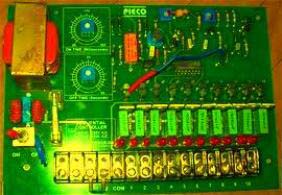

Featured AMCAT Module: Instrumentation Engineering
Instrumentation Engineering

The Instrumentation Engineering module has been designed to assess graduates from various Engineering backgrounds such as Instrumentation and Control Engineering, Applied Electronics and Instrumentation Engineering, Electronics and Instrumentation Engineering, Electronics Instrumentation and Control Engineering and Instrumentation Engineering on their knowledge of uses and application of various electronic devices and instruments in industries and instrumentation and control labs. The module presents a test which is a mix of theoretical, numerical and concept-based questions. The test evaluates a student's knowledge about various combinational and sequential circuits, principles and operation of electronic measurement instruments, microcontroller and microprocessor applications in instrumentation, etc.
An inter-disciplinary branch, Instrumentation engineering comprises of study of electrical, chemical, electronics as well as computer engineering. Instrumentation and control engineers design, manufacture and fix snags in instruments that control or monitor physical quantities such as temperature, pressure, etc., in engineering systems, machinery and processes. Industries with automated processes, such as chemical or manufacturing plants, require Instrumentation and control engineers for enhancing system productivity, reliability, and safety.
Since they help in the designing, construction and maintenance of instruments and entire instrumentation systems of an industrial plant, their role is critically important for its smooth run. While recruiting, employers look for imaginative graduates with strong practical abilities who are business minded and inclined to work in a team.
The key skills and competencies that an Instrumentation engineer must possess are: Project management skills, Troubleshooting and problem-solving skills, Computer skills, and leadership abilities.
Project management
An Instrumentation engineer must possess good project management skills, since he has to prepare and agree to project budgets, timelines and specifications with various clients/managers.
Problem Solving
Often he has to step in to fix snags in systems and devices. He should be a good trouble-shooter and possess excellent problem-solving skills. If the instrumentation system fails, the whole plant comes to a grinding to a halt.
Computer Skills
The nature of his job requires him to be skilled at handling instruments and software. He designs and develops new control systems. He should be able to write computer software to support his work.
Logical Ability
Since instrumentation engineers are presumed to be good in physics, they should exhibit higher logical ability- a basic skill to excel in this industry. They should be good at analyzing and interpreting data.
Management skills
Good management skills are a must have for Instrumentation engineers. They have to manage operations, develop business proposals, collaborate with design engineers, operation engineers, purchasers and other internal staff apart from coordinating with clients, suppliers, contractors and relevant authorities.
Scope for growth
Electronics and Instrumentation Engineering is growing at a fast pace, so is the scope for career growth. Over the last couple of decades, it has seen widespread application in almost all discipline of engineering from mining and metallurgy, robotics, textile, rolling mills, cranes and hoists, arc furnaces, chemical engineering, process control to static relays.
Tips to Improve
- Widen your knowledge base
To stay ahead of competition, widen your knowledge base. This will give you an edge your peers and mechanical or electrical engineers while working in a plant. - Shoulder more responsibility
The role of an Instrumentation Engineer is a highly responsible one. If the instrumentation system fails, the whole plant goes to a grinding a halt. So learn to be more responsible. - Keep abreast of the industry trend
You need to be conversant with global trends and researches done worldwide. This would help you keep ahead of competition. Join a professional society and participate in seminars and workshops, subscribe to important trade media journals and newsletters to get a grip of where the electronics industry is heading. - Join a professional society
To keep abreast of latest trends in the industry, one can join a professional society for instrumentation that provides educational and career information about this growing field. Some such societies are the Instrument Society of America, the Instrumentation and Measurements Society of IEEE, the Institute of Diagnostic Engineers (US), and the Institute of Measurement and Control (UK).




